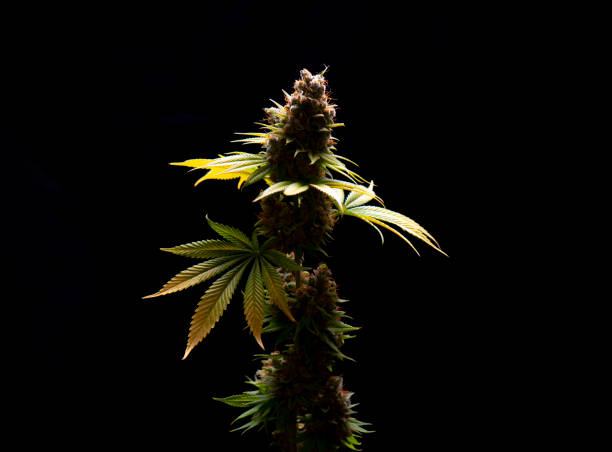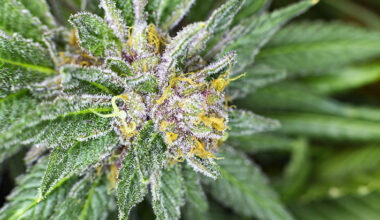When cannabis enthusiasts talk about pungent, fuel-like strains, the term “diesel” often comes up. But behind this signature aroma lies a complex chemical makeup, particularly the diesel terpene. Terpenes are aromatic compounds found in countless plants, including cannabis, and they are responsible for the distinctive scents and flavors we associate with specific strains. In the case of diesel strains like Sour Diesel or NYC Diesel, the diesel terpene profile refers to a unique combination of compounds that produce the characteristic gassy smell. More importantly, these terpenes do more than just shape the sensory experience; they also influence the effects users feel, such as stimulation, clarity, or even relaxation. As interest in terpene science continues to grow, understanding the diesel terpene and its applications is essential for both consumers and product developers.
Breaking Down the Diesel Aroma: What Causes It?
The term “diesel” in cannabis doesn’t refer to an isolated compound, but rather a combination of several terpenes that together create the sharp, fuel-like scent associated with certain strains. The diesel terpene profile often includes myrcene, limonene, caryophyllene, and pinene, as well as smaller concentrations of terpenes like ocimene and terpinolene. Myrcene adds an earthy and musky foundation, while limonene brightens the aroma with citrusy notes. Caryophyllene introduces a peppery sharpness, and pinene contributes a fresh, piney finish. It’s the way these terpenes interact in high concentrations that results in the unmistakable diesel-like scent. This powerful aromatic profile isn’t just about fragrance it signals a specific kind of cannabis experience that users seek out for its energizing and uplifting effects.
The Diesel Terpene and Its Role in Cannabis Effects
While the diesel terpene is most often discussed in terms of aroma, it also plays a significant role in shaping the effects of the strains it dominates. Diesel strains are typically associated with energy, mental clarity, and creativity, making them popular for daytime use. This is due in part to the high presence of limonene and pinene, two terpenes that are known for their mood-boosting and focus-enhancing qualities. Myrcene, although generally more sedative, provides balance to the stimulating components, preventing overstimulation and promoting a smooth experience. Caryophyllene may contribute anti-inflammatory effects and interact with the body’s endocannabinoid system to help regulate stress responses. Together, the terpenes that define the diesel terpene profile offer a full-spectrum effect that is both invigorating and grounding ideal for those looking to remain productive or social.
Flavor and Sensory Experience of Diesel Terpene Strains
The sensory profile of diesel strains is bold, intense, and often polarizing. For some, the sharp fuel-like aroma and taste are overwhelming, while others consider it a mark of quality and strength. The diesel terpene profile creates a flavor that mirrors the scent, with tangy, skunky top notes followed by a lingering aftertaste of citrus, earth, and spice. This powerful flavor experience is often preferred by seasoned cannabis users who are familiar with the strain’s effects and appreciate its intensity. Importantly, the strength of the diesel terpene also serves as a good indicator of freshness and terpene preservation in both flower and concentrate products. Whether smoked, vaporized, or infused in other formats, these terpenes deliver a consistent and memorable experience.
Applications of Diesel Terpenes Beyond Cannabis Flower
The popularity of diesel strains has driven demand for diesel terpene profiles in products far beyond traditional cannabis flower. With the rise of legal cannabis markets and terpene extraction technologies, it’s now possible to isolate and reproduce these terpene blends for use in vape cartridges, edibles, tinctures, and topicals. For consumers who love the diesel flavor and effects but prefer not to smoke, these products offer a convenient alternative. Outside of cannabis, the diesel terpene is also making its way into aromatherapy and wellness products, where it is used to support focus, energy, and mood through scent alone. A few drops of terpene concentrate added to a diffuser or bath product can replicate the uplifting effects of diesel strains without any cannabinoids involved. This versatility is one of the reasons diesel terpenes are increasingly sought after by both wellness professionals and product formulators.
Why Diesel Terpenes Are Popular in Product Development
For product developers in the cannabis space, the diesel terpene profile is highly desirable because of its instant recognizability and consumer demand. Brands that offer strain-specific products often choose diesel profiles to appeal to experienced users who seek a potent, energizing effect. Whether developing a vape cartridge, concentrate, or terpene-infused oil, using a diesel terpene blend adds a signature flavor and aromatic intensity that stands out. Additionally, the diesel aroma tends to pair well with other functional ingredients in wellness formulations, such as citrus oils or botanical extracts designed to enhance focus and energy. Since these terpenes are legal and derived from non-cannabis sources in many cases, they also offer flexibility in branding and distribution, particularly in non-THC or hemp-based product lines.
FAQs
What is a diesel terpene?
A diesel terpene is a term used to describe the blend of terpenes that create the strong, fuel-like aroma found in certain cannabis strains like Sour Diesel and NYC Diesel. It typically includes myrcene, limonene, caryophyllene, and pinene.
Does the diesel terpene get you high?
No, terpenes do not produce intoxication on their own. However, when combined with cannabinoids like THC, diesel terpenes can influence the overall experience by enhancing focus, energy, and mood through the entourage effect.
Can I use diesel terpene blends in non-cannabis products?
Yes, diesel terpene blends are often used in aromatherapy, skincare, and wellness products. They must be properly diluted and sourced from reputable suppliers, but they can deliver aromatic and functional benefits without any THC.
Why do some people love the smell of diesel strains?
The sharp, pungent smell of diesel strains is often associated with potency and effectiveness. For many seasoned users, this aroma signals a strong, energizing experience that’s ideal for daytime use or creative tasks.
Where can I find high-quality diesel terpene products?
You can purchase premium diesel terpene blends from specialized retailers like Mass Terpenes, which offer strain-specific profiles for a variety of uses, including vaping, infusions, and aromatherapy.
Conclusion
The diesel terpene represents a distinctive and powerful component of cannabis that goes beyond aroma to shape user experience and product design. With its sharp, fuel-like scent and energizing effect profile, it remains one of the most recognizable terpene blends in the industry. Whether you’re a fan of Sour Diesel flower or looking to incorporate this iconic scent into a wellness product, understanding the diesel terpene is key to making informed choices. As terpene science continues to grow, consumers and creators alike are beginning to appreciate the complexity and potential of these compounds in new and exciting ways. The diesel terpene stands as a bold example of how aroma, chemistry, and effect come together to define the cannabis experience and expand its possibilities into aromatherapy, product formulation, and beyond.
Medical Disclaimer:
The information provided in these blog posts is intended for general informational and educational purposes only. It is not a substitute for professional medical advice, diagnosis, or treatment. Always seek the advice of your physician or other qualified healthcare provider with any questions you may have regarding a medical condition. The use of any information provided in these blog posts is solely at your own risk. The authors and the website do not recommend or endorse any specific products, treatments, or procedures mentioned. Reliance on any information in these blog posts is solely at your own discretion.






